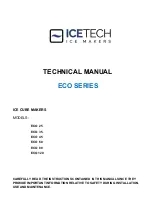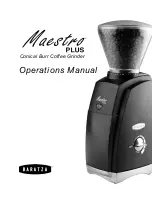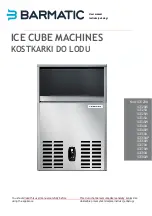
Subsequent preparation of
other coffees
I)
To make other coffees,
repeat operations E to H.
How to obtain steam
(making a cappuccino)
J)
Ensure that there is no
serving in the filterholder.
With the steam valve (7) in a
closed position, turn on the
steam switch (2).
If the temperature pilot light
(6) was not already on, this
operation will make it come
on.
K)
After turning off the
temperature pilot light (6),
open the steam valve (7)
slightly, by turning anti-
clockwise, and release the
residual water from the pipe
(9) until the steam arrives.
When steam starts to come
out, close the valve (7).
L)
Place a recipient with the
milk under the steam-
cappuccino outlet pipe (9) so
that part of it is immersed.
Then open the steam valve (7)
to obtain the steam required.
A special hole at the side of
the nozzle makes it possible
for a small portion of air to be
absorbed, which, mixing with
the milk, transforms it into
foam for cappuccino. If this
does not occur, alter the
position of the recipient so
that the air absorption hole
(17) is not covered by the
milk.
It is preferable to use very
cold milk.
Turn off the steam switch
(2).
If you note a reduction in the
supply of steam, close the
steam valve (7) and turn on
the coffee switch (3) until
water comes out of the filter-
holder (8). Then repeat steps
K and L.
M) It is very important to
avoid making an espresso
immediately after the
steam is supplied, as the
machine is still too hot.
To reduce the temperature of
the machine quickly and
obtain a perfect espresso,
follow the instructions below:
- Ensure that there is no
serving in the filterholder.
- Turn on the coffee switch (3)
and put a recipient under the
filter-holder (13) enabling the
hot water to come out until
the temperature pilot light
comes on (6).
- Turn off the coffee switch
(3), thus interrupting the flow
of water and wait for the
temperature pilot light to go
off: the machine is now again
ready to make another
espresso.
THE MANUFACTURER RESERVES
THE RIGHT TO MAKE
MODIFICATIONS OR IMPROVEMENTS
WITHOUT PRIOR NOTICE.
TECHNICAL CHARACTERISTICS:
VOLTAGE: 220/230 V
(110/120 V US - 110 V J)
POWER: 1.050 W
I N S T R U C T I O N M A N U A L
General Rules for Using the
Machine
The machine must be kept
clean by frequently rinsing the
drawer (12), the filter-holder
(13) and the tank (10), the
steam outlet pipe (9) and the
air absorption hole (17).
VERY IMPORTANT: never
immerse the machine in water
or put it in a dishwasher.
The water contained in the
tank (10) must be regularly
changed. After changing the
water, check that the intake
pipe (15) is positioned inside
the tank (10).
It is recommended that every
three months you use a
mixture specially designed for
espresso machines to remove
limescale. To enjoy a perfect
espresso, you are advised to
keep the cups warm using the
cup-warmer (1) incorporated in
the machine.
Operating the Machine
Installation
A)
Check that the voltage of
the supply current is correct
by looking on the plate (16): if
so, connect the machine to
the socket.
B)
Half-fill the tank with cold
water (10), ensuring that the
intake pipe (15) is immersed
in the water. Place a recipient
under the filter-holder (8).
Turn on the general switch (4)
and make the water circulate
around the internal circuit by
turning on the coffee switch (3).
C)
Fill the tank again (10),
checking that the intake pipe
(15) is immersed in the water.
How to obtain the first
coffee after installing (or
turning off) the machine
To make sure the machine is
in the ideal condition to make
a perfect espresso, follow the
instructions below:
D)
Turn on the main switch (4)
and make sure the starting
pilot light (5) is on: if the
temperature of the machine is
not sufficiently high, the
temperature pilot light (6) will
come on.
Place the filter-holder (13) in
its housing. Wait for the
temperature pilot light (6) to
go off. Place a cup under the
filter-holder (13) and turn on
the coffee switch (3). Allow
the hot water to come out.
Empty the hot water from the
cup.
At this point the machine and
the cup are ready for a perfect
espresso.
E)
Take out an E.S.E. serving
and place it in the filter-holder
(13) with the printed side
facing downwards.
F)
Place the filter-holder (13)
in its housing, rotating until it
is firmly fitted making a good
seal.
G)
Make the coffee by turning
on the switch (3): once you
have the desired quantity of
coffee (extra strong or mild),
turn off the switch (3).
H)
Remove the filter-holder
(13) from its housing, by
repeating the operation
described in point F) in
reverse. Dispose of the used
E.S.E serving.
GB





























